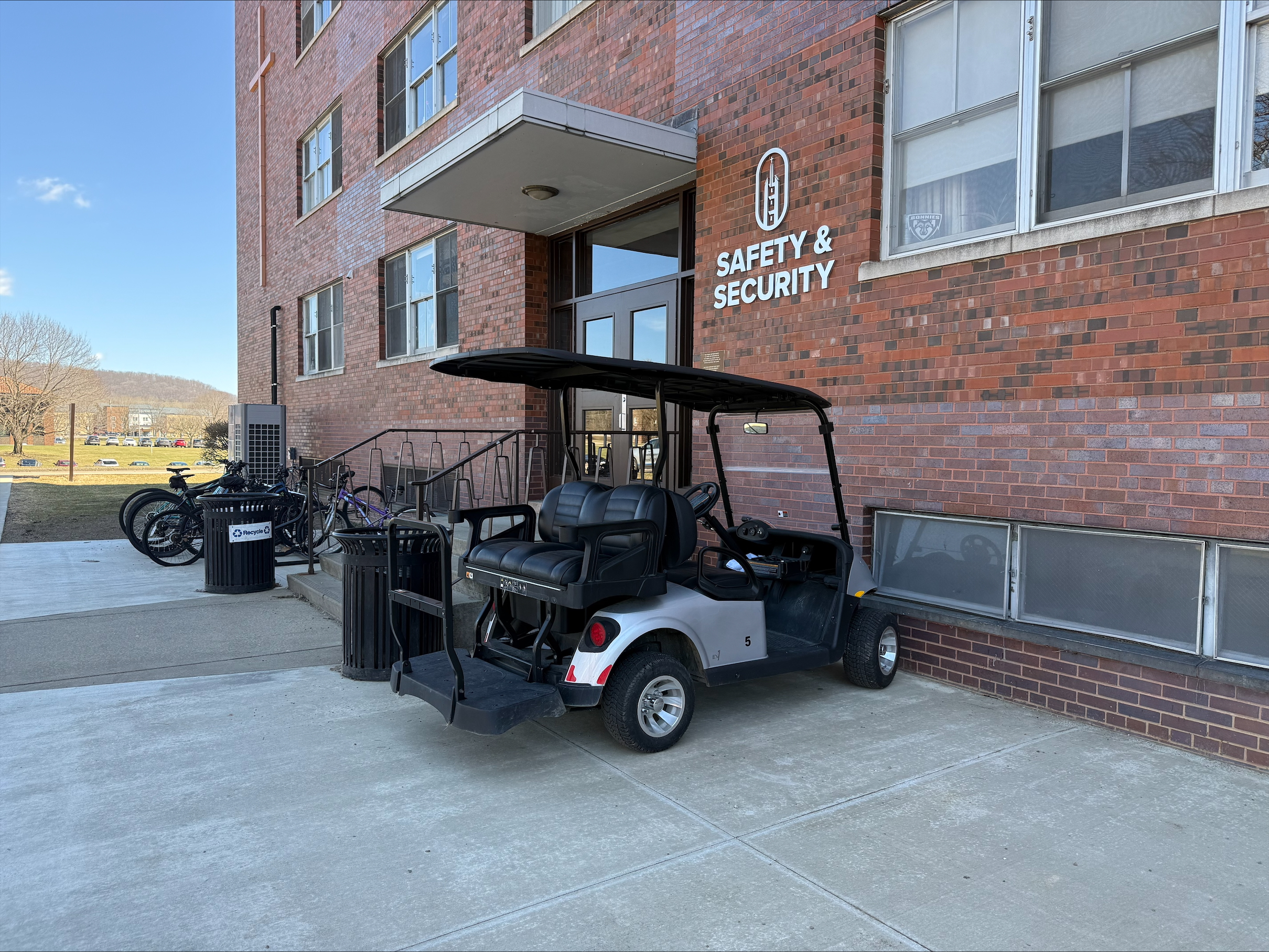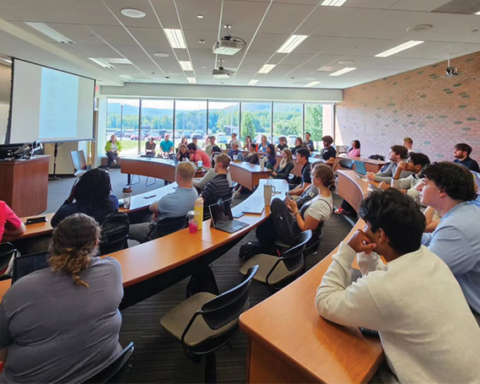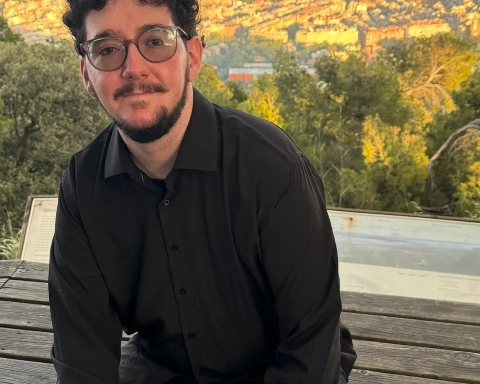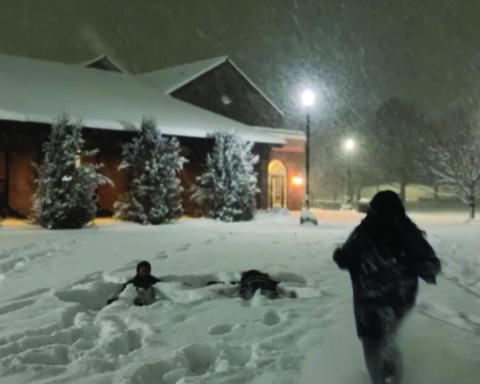By Kailyn Jennings
Contributing Writer
This May, for the first time in St. Bonaventure University history, students will graduate with a Franciscan Studies minor.
Franciscan Studies professor Jean-Francois Godet-Calogeras is the force behind the minor’s newfound success. He guided Dennis Kurian, Jeff Georgiades, Melissa Misenheimer and Lori Kim to the minor.
“The minor was designed at a time of transition for the School of Franciscan Studies,” said Godet-Calogeras. “Until 2009 or so, the School was only offering a curriculum at the graduate level, but for a few reasons the enrollment was going down. So, a minor in Franciscan Studies was designed and approved by the Faculty Senate and the University President. But I don’t know why it was never advertised.”
Kurian, a biology major, said he chanced upon the minor while on the Bonaventure website last school year.
“I was surprised, happily surprised,” said Godet-Calogeras. “I always believed in the voice of the students. I was delighted that a student had discovered the existence of the minor and wanted to enroll in it. And would be soon followed by others.”
The four students, after taking Franciscan classes taught by Godet-Calogeras, wanted to pursue the minor left in the shadows.
“I was impressed and deeply stirred by the way [Godet-Calogeras] both taught Franciscanism and lived it in his own unique way,” said Kurian. “After taking several classes with him, the minor became a very realistic possibility.”
Kim, a biology major, said she took Catholic Franciscan Heritage, a course required of all students, with Godet-Calogeras who broke down Catholicism and Franciscanism for students who were not raised with those backgrounds. He did not assume students understood the terms simply because they attended a Catholic Franciscan university.
However, the students said they struggled with seeking approval for the minor.
“Two of the classes needed were considered graduate level classes,” said Misenheimer, a psychology major. “I had to turn in a bunch of forms asking for permission to take them. The minor was very difficult to pursue.”
Kurian agreed.
“A problem we ran into was recreating the new Franciscan classes that were offered,” said Kurian. “There was an administrative process to getting the minor approved and obtaining the approval form from all the necessary people. A huge help in this entire process was Fr. David Couturier,” dean of the School of Franciscan Studies. “He guided us through the process of approval and basically did all the work for us.”
The students said the struggle for approval was surprising.
“As a Franciscan school, St. Bonaventure University should naturally emphasize the Franciscan studies minor,” Kurian said. “I have told others that I am doing a minor in Franciscan studies and am often met with surprise and interest. So far, no one in the student body seems to have known about the existence of the minor.”
The students said franciscanism has taken a valuable place in their lives – one they hope more students will experience.
“For me, Franciscanism is a method of approaching the world that will always remain a part of me,” said Kurian. “This method includes a strong sense of compassion and a deep care for the sick and suffering. It includes enjoying work and going about it happily, without complaint. It includes sacrifice and sometimes looking at the needs of others before one’s own. It includes a deep appreciation of all living things. It includes a virtuous living and an established moral code.”
Georgiades, a biology major, said Franciscanism is more than simply a minor; it’s a lifestyle that has positively influenced him.
“After graduating from Bonaventure I plan to go into the medical field,” said Georgiades. “One of the things that is often overlooked in medicine is the patient. The Franciscan life is one of compassion and mercy, working to help people where possible. Compassion is the most important part of medicine, and the Franciscan ideals line up well.”
The students said they found that their peers do not understand the meaning of Franciscanism. Many believe they must be religious to be Franciscan, when actually the two can be practiced both inclusively and exclusively from each other.
“The word Franciscan does not, as many assume, imply monkhood,” said Georgiades. “Francis of Assisi did not live isolated from the rest of the world. He worked as a part of the world, taking nothing for himself, but giving what he could to help the people around him, living with his friends as brothers and sisters would. That, to me, is Franciscanism. It is not a clerical life, but a life in which people can build relationships and work to help each other when they need it.”
Francis of Assisi, along with Clare of Assisi, devoted their ascetic lives to poverty and compassion, thus founding the Franciscan movement.
Misenheimer added, “[The Franciscan] beliefs and core characteristics are universal; anyone can relate to compassion, mercy, empathy and family.”
St. Bonaventure University preaches compassion, but it has work to do if it desires its Franciscan Studies department to continue to grow.
“The university portrays itself as Franciscan, and so the minor in Franciscan studies should be emphasized more than it is now, at least to validate [the university’s] claim to be Franciscan,” said Georgiades.
Misenheimer believes the university should advertise the minor during admissions events, club fairs, orientation and within every Catholic Franciscan Heritage course, a class required of all students, so prospective students and freshmen can immediately appreciate the Franciscan aspect of the school.
Godet-Calogeras said he is concerned with the minor’s future. But he also has faith in it.
“Obviously, some courses like the Catholic Franciscan Heritage can and maybe should play as a spark or an appetizer, that is, raise the desire to learn and know more about that Franciscan heritage and how it can inspire daily life today without necessarily become a member of a religious order. That is what happened to the four students who will graduate in May,” said Godet-Calogeras. “As the Franciscan movement started with a handful of people, we hope that more students will follow and that some day the Franciscan heritage will influence all schools and departments of St. Bonaventure University.”





